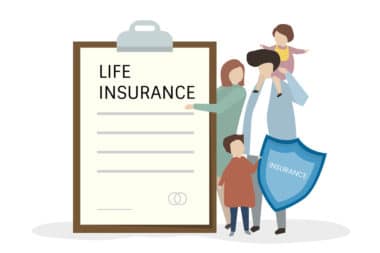Life Insurance is not usually at the top of people’s minds, especially for those who are in their 20s. However, you may be surprised to learn that the earlier you buy a life insurance policy, the better it is for you financially.
Many people ponder whether they should buy life insurance or just question themselves on when to buy life insurance. When it comes to getting insurance, your age, fitness, and other personal factors all play a role.
The size of your family and your financial wellbeing are two personal factors to consider when purchasing life insurance. Though your age and fitness affect the cost of premiums, your household and finances are also important deciding factors.
What is life insurance?
A life insurance policy is a legally binding agreement between a person and an insurance company.
That legally binding agreement notates the amount of money a person’s family will receive after dying if they make monthly premium payments until the time of death. The insurance company provides a lump-sum payment, referred to as a death benefit, to anyone you listed as a beneficiary.
The sum of money you want to pay out to your loved ones is determined by the wishes and desires of yourself and your family. The amount you choose is also influenced by the cost of living, the size of your family, and their overall financial needs.
How exactly does life insurance work?
Life insurance works by making regular contributions to an insurance provider while you are alive in return for a payout to your relatives following your death.
The purpose of life insurance is to substitute your financial obligation to your home when you pass. The biggest advantage of purchasing a life insurance policy is that it will provide the financial protection your loved ones will require whenever you pass.
Your families don’t have to worry about saving for your funeral or all other necessary arrangements when you die since life insurance will cover the expenses. Once funeral plans have been established and paid for, the remaining money will be distributed to the heirs by the insurance company.
When should I buy life insurance?
When you have children or intend to marry, you should purchase life insurance.
The major error that people tend to make is assuming they do not need any insurance coverage because they are still young. Though the chances of dying in your 20s or 30s are statistically low, something can happen to lead to your early demise.
Plus, your living conditions are a better determining factor on whether to purchase life insurance than your age. Someone who works from home may struggle with staying healthy compared to someone who goes into the office every day.
Your health status is a big life condition to focus on when deciding on the best time to purchase a life insurance policy.
However, when considering your life conditions and the necessity of buying a life insurance policy, you should also consider various other factors like cremation or burial costs.
Lifestyle factors such as outstanding debts, co-signed loans with a friend or family member, and the livelihood of your family after you pass need to be considered as well.
If at the moment, your main concern in life is providing for someone else or helping someone else financially, the time to purchase a life insurance policy is now.
What are the reasons I need life insurance now?
Younger people don’t add life insurance to their list of financial commitments, particularly if they are single with no children.
Alternatively, if marriage or children seem to be in the immediate future, life insurance should be added to the list of goals regardless of your age. Here are some of the most important questions you should ask yourself when deciding if you should purchase life insurance:
- Do you plan on getting pregnant?
- Do you have a newborn?
- Are you trying to defeat severe postpartum depression?
- Are you getting married?
- Are you currently (or will be) providing financial assistance to aging parents?
- Are you in debt?
- Are you self-employed or do you work for a company?
- Do you regularly participate in high endurance sports or activities?
- Do you currently (or plan to) work in a high-risk occupation?
While some answers to the above questions are compelling reasons to buy life insurance, the most significant factor is if someone else counts on your money.
If you have a substantial amount of money set aside or other financial cushions to fall back on, you do not need a life insurance policy, but for some, not having one may be expensive.
Why Dependents Are a Determining Factor
The purpose of life insurance is to replace your salary so that your family can stay in their house, eat, and pay their monthly bills.
A retirement account you left behind may be adequate to sustain one or two dependents temporarily, but it may not be sufficient. If you have people who depend on your money, their lives would be very different if you are no longer in the picture.
If you are wondering whether to get life insurance, think about what your family will do after you are gone. If your thoughts revolve around them trying to make ends meet, purchasing a life insurance policy will be in their best interest.
How much life insurance will I need?
If you have enough savings to cover funeral costs and bills for a year or two following your death, life insurance can simply be used to help pay for your child’s future college expenses or to leave them something behind.
The total amount of money available for life insurance premiums ranges from $10,000 and $10 million, but your salary decides how much coverage you will get. Insurance providers propose that you buy a package that is six to 10 times the value of your taxable salary.
Another method for estimating your policy coverage is to calculate the number of years before retirement by your annual income. In this case, you will be able to offset your entire annual salary for years.
As a result, the family will have enough time to replenish the amount of money you contribute to the household.
For instance, if you earn $45,000 a year, a $400,000 insurance payout will replace your salary for at least eight years after your death. Though, keep in mind that how long the funds last is determined by how they are spent by your survivors.
To make things easier for your family, you can take out a $600,000 insurance policy if you have a $200,000 home loan or other debt. They can pay off the mortgage loan and use the remaining funds to cover them financially for the next few years.
Lastly, keep in mind that there are two types of life insurance policies you can choose from when deciding when to buy a policy.
Term life insurance and fixed (or whole) life insurance are the two types of life insurance. Term life insurance has primary coverage for a set time. Depending on the policy, this coverage will extend anywhere from 10 to 30 years.
Permanent life insurance, on the other hand, extends for the rest of your life and normally comes with the option to create cash capital. Considering these two policy types can help you decide when is the best time for you to buy a policy.
Author Bio: Imani Francies writes and researches for the life insurance comparison site, QuickQuote.com. She enjoys helping people find the best life insurance policy and rates that meet their specific needs.








Reply